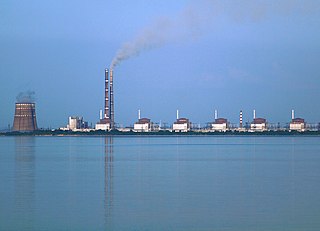Reception in the world
The Special Envoy of the Prime Minister of the United Kingdom Catherine Meyer supported the initiative of Ukrainian companies on the inadmissibility of cooperation with Russia in the energy sector. [5]
On April 29, 2022, during a full-scale Russian invasion of Ukraine, hundreds of people picketed Engie's office as part of Stop Bloody Energy. [6] The protesters wanted to end gas contracts with Russia and stop giving money to a country that supports terrorism.
On May 24, 2022, during the World Economic Forum in Davos, dozens of activists from Ukraine and Europe took part in the Stop Bloody Energy initiative against the energy business, which, despite armed aggression, continued to operate in Russia and buy Russian energy resources. [7]
On May 31, the European Union approved a sixth package of sanctions against Russia over Russia's invasion of Ukraine. [8] The sanctions related to energy are also a part of the sixth package. In particular, the EU prohibits the purchase, import, or transportation of crude oil and certain petroleum products from Russia to the EU. The planned duration of the gradual withdrawal from Russian oil is from 6 months for crude oil to 8 months for other oil products. A temporary exemption is made for EU member states that depend on Russian oil supplies because of their location and have no other good options. These countries can import crude oil by pipeline.

PJSC Gazprom is a Russian majority state-owned multinational energy corporation headquartered in the Lakhta Center in Saint Petersburg. As of 2019, with sales over $120,000,000,000, it was ranked as the largest publicly listed natural gas company in the world and the largest company in Russia by revenue. In the 2020 Forbes Global 2000, Gazprom was ranked as the 32nd -largest public company in the world. Gazprom name is a contraction of the Russian words gazovaya promyshlennost. In January 2022, Gazprom displaced Sberbank from the first place in the list of the largest companies in Russia by market capitalization.

Economic sanctions are commercial and financial penalties applied by one or more countries against a targeted self-governing state, group, or individual. Economic sanctions are not necessarily imposed because of economic circumstances—they may also be imposed for a variety of political, military, and social issues. Economic sanctions can be used for achieving domestic and international purposes.

Vladimir Leonidovich Bogdanov is a Russian businessman and oil tycoon.

Naftogaz of Ukraine is the largest national oil and gas company of Ukraine. It is a state-owned company subordinated to the Government of Ukraine. The vertical-integrated company carries out a complete cycle of exploration operations and development of deposits, operating and exploratory drilling, extraction, transportation, and refinement of natural gas and crude oil, supply of natural and liquefied gas to consumers.
Polskie Górnictwo Naftowe i Gazownictwo S.A., abbreviated to PGNiG, is a Polish state-controlled oil and gas company, headquartered in Warsaw, Poland. The Company has branches and representative offices in Russia, Pakistan, Belarus and Ukraine and holds equity interests in some 30 subsidiaries, including providers of specialist geophysical, drilling and well services.

Energy security is the association between national security and the availability of natural resources for energy consumption. Access to (relatively) cheap energy has become essential to the functioning of modern economies. However, the uneven distribution of energy supplies among countries has led to significant vulnerabilities. International energy relations have contributed to the globalization of the world leading to energy security and energy vulnerability at the same time.

Russia–Switzerland relations are foreign relations between Russia and Switzerland. Switzerland opened a consulate in Saint Petersburg in 1816, upgrading it to a legation 90 years later. The two countries broke off diplomatic relations in 1923, when Russia was going through a period of revolutionary turmoil – and they were not resumed until 1946.
Vitol is a Dutch energy and commodity trading company that was founded in Rotterdam in 1966 by Henk Viëtor and Jacques Detiger. Though physical trading, logistics and distribution are at the core of the business, these are complemented by refining, shipping, terminals, exploration and production, power generation, and retail businesses. Vitol has 40 offices worldwide and its largest operations are in Geneva, Houston, London, and Singapore. With revenues of $231 billion in 2018, it is the largest independent energy trader in the world, and would rank ninth on the Fortune Global 500 list. Because Vitol does not publish its profits widely, much like most of its competitors in commodity trading, it is largely excluded from rankings. The company does provide financial information to its lenders and some energy groups with which it trades. The company ships more than 350 million tonnes of crude oil per year and controls 250 supertankers and other vessels to move it around the world. On average it handles more than 7 million barrels a day of oil and products - roughly equivalent to the daily consumption of Japan - the world's fourth largest oil consumer after the United States, China, and India.
SEFE Securing Energy for Europe GmbH, a company registered in Berlin, Germany, is headquarters of a diversified conglomerate, comprises 40 entities operating in more than 20 countries in Europe, Asia and North America. Under the former name Gazprom Germania GmbH it was a 100% subsidiary of the world's largest natural gas company, Gazprom, from 1990 to 2022. Since 2022, Germany's federal energy regulator – the Bundesnetzagentur – has controlled the company as a temporary trustee.

Russia supplies a significant volume of fossil fuels to other European countries. In 2021 it was the largest exporter of oil and natural gas to the European Union, and 40% of gas consumed in the EU came from Russia.
Ukraine has been estimated to possess natural gas reserves of over 1 trillion cubic meters and in 2018 was ranked 26th among countries with proved reserves of natural gas. Its total gas reserves have been estimated at 5.4 trillion cubic meters. In 2021, Ukraine produced 19.8 billion cubic meters (bcm or Gm3) of natural gas. To satisfy domestic demand of 27.3 bcm that year, Ukraine relied on gas imports (2.6 bcm) and withdrawal from underground storage (4.9 bcm). Winter demand can reach 150 mcm per day. To meet domestic demand, Ukraine plans to increase domestic natural gas output to 27 bcm.

DTEK is the largest private investor in the energy industry in Ukraine. The company's enterprises generate electricity at solar, wind and thermal power plants; extract coal and natural gas, trade energy products in the Ukrainian and foreign markets, distribute and supply electricity to consumers, and develop a grid of supercharger stations for e-vehicles.

Energy in Ukraine is mainly from gas and coal, followed by nuclear then oil. The coal industry has been disrupted by conflict. Most gas and oil is imported, but since 2015 energy policy has prioritised diversifying energy supply.
Chornomornaftogaz is an oil and gas company located along Krymgazseti in Simferopol, Crimea. The company was established with the order of the Ministry of Gas Industry of the USSR on 20 October 1978 №209-org to develop oil and gas resources in the Black Sea and the Sea of Azov.

International sanctions have been imposed during the Russo-Ukrainian War by a large number of countries, including the United States, Canada, and the European Union against Russia and Crimea following the Russian invasion of Ukraine, which began in late February 2014. Belarus has also been sanctioned for its cooperation with and assistance to Russian armed forces. The sanctions were imposed by the United States, among other countries and international organisations against individuals, businesses and officials from Russia, and Ukraine. Russia responded with sanctions against several countries, including a total ban on food imports from Australia, Canada, Norway, Japan, the United States and the EU.
Nord Stream 2 is a 1,234-km natural gas pipeline from Russia to Germany running through the Baltic Sea, financed by Gazprom and several European energy companies. It was started in 2011 to expand the Nord Stream line and double annual capacity to 110 billion m3. It was completed in September 2021, but has not yet entered service. Planning and construction of the pipeline was mired in political controversy over fears that Russia would use it for geopolitical advantage with Europe and Ukraine.

The 2021–2022 global energy crisis is the most recent in a series of cyclical energy shortages experienced over the last fifty years. It is more acutely affecting countries such as the United Kingdom and China, among others.

The economic impact of the 2022 Russian invasion of Ukraine began in late February 2022, in the days after the Russian Federation recognized two break-away Ukrainian republics and commenced a war in Ukraine. The subsequent economic sanctions have targeted large parts of the Russian economy, Russian oligarchs, and members of the Russian government. Russia has responded with sanctions of its own. Both the conflict and the sanctions have had a strongly negative impact on the world economic recovery during the ongoing COVID-19 recession. As a result of its war, estimates of a 30-year economic setback are projected for Russia.

The Russia–EU gas dispute flared up in March 2022 following the escalation of the Russo-Ukrainian War that occurred in late February that year as Russia and the major EU countries clashed over the issue of payment for pipeline natural gas exported to Europe by Russia's Gazprom.
The 2022 Russian invasion of Ukraine has led to serious environmental consequences. The invasion has resulted in forest fires, air pollution, soil contamination, water pollution, inundation and damage to nature reserves. This has placed increased stress on ecosystems and the environment, accelerating the climate crisis.












